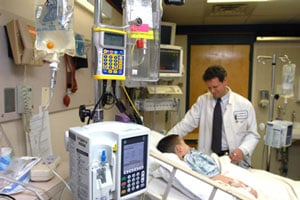 |
|
| Critical care specialist Scot Bateman, MD, in the pediatric intensive care unit. |
As a doctor in charge of a pediatric intensive care unit, Scot Bateman, MD, has been treating Worcester-area children potentially infected with enterovirus D68.
“We have admitted a large number of patients to the Pediatric Intensive Care Unit who have a more prolonged asthma exacerbation that seems consistent with the reports of this enterovirus,” said Dr. Bateman, associate clinical professor of pediatrics and director of the PICU at UMass Memorial Medical Center. “In the last month we’ve seen a significant increase in the number of patients with the most severe form of asthma that requires ICU-level care.”
While awaiting results from testing to confirm enterovirus D68 diagnoses, children with severe upper respiratory infections and exacerbated asthma symptoms receive the same treatment as they normally would.
“There is no treatment for this virus other than supportive care. We just have to be patient, using standard therapies such as bronchodilators, steroids and supplemental oxygen,” said Bateman. “It does seem to be running its course, just taking a little longer than we’re used to.”
While intensive care stays for suspected enterovirus and its complications have varied from one day to several, depending on the child’s symptoms, Bateman said that every patient has had a good outcome.
Of the polio-like symptoms that have been reported with some cases of enterovirus, Bateman said those are rare. “There are parallels between this enterovirus outbreak and what happens when there’s a large flu outbreak. Flu is a virus that doesn’t typically cause neurological symptoms, but occasionally it does, especially when a large number of people have it. Similar to complicated flu, we’re talking a very rare complication with enterovirus.”
And for most children who developed neurological symptoms with a viral infection, they usually are self-limited, he said.
“Some take longer than others, but in children who have these symptoms with flu, most get better, with treatment options including anti-inflammatories and steroids.
Bateman urges the public to be extra conscientious with simple measures like frequent hand washing to prevent further spread of enterovirus. “It’s probably infecting adults too but for most of them it is just going to be a common cold that they walk around with, different from the flu when you’re sick enough to be home in bed,” he said. “The ability to spread that around in schools, daycare centers and workplaces is very easy.
“Everyone should be following the same hygiene recommendations to keep from spreading colds. That means being respectful of others when you have a cold by sneezing into your elbow and washing your own hands,” Bateman urged.
“Kids are going to get colds this winter and most of them are going to be just colds. But parents of children with colds who have underlying asthma should be very vigilant about worsening symptoms.”
Related links on UMassMedNow:
Expert’s Corner: UMMS pediatrician explains rare respiratory illness outbreak in parts of country
Doctors call for use of safer drug formulation, drug maker responds: Candy-look-alike prescriptions for adults a danger for toddlers at home
SimBaby allows PICU residents, nurses and technicians to train for crises